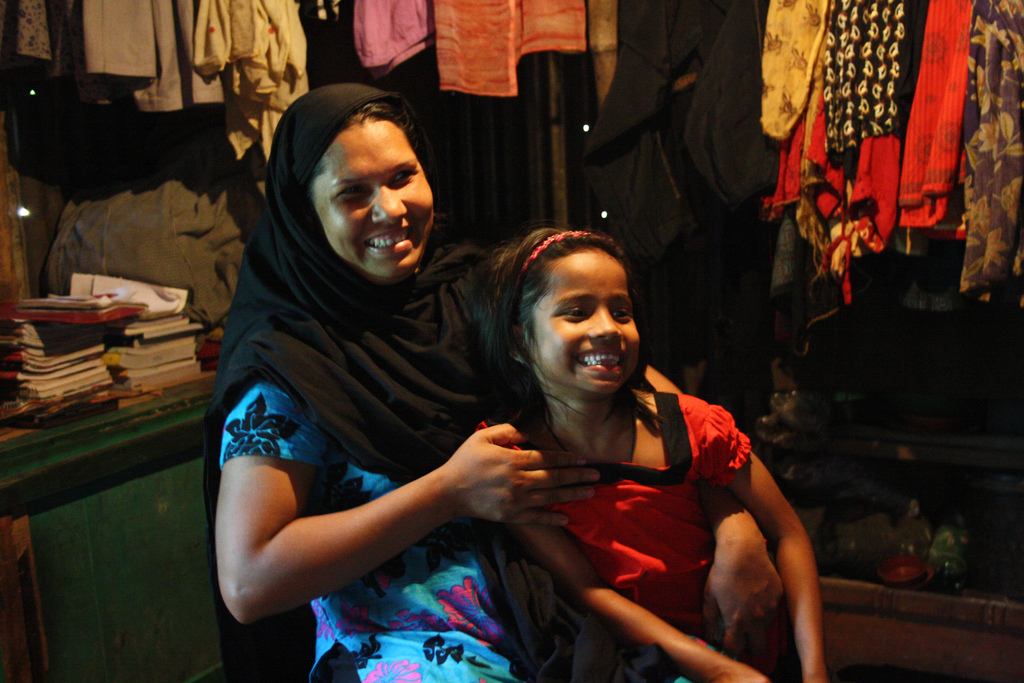In March, Bishop John Arnold, Bishop of Salford Diocese and CAFOD Chair of Trustees was in Bangladesh with CAFOD to visit local partners and projects in the region. Among the projects he visited was Ovibashi Karmi Unnayan Program (OKUP), a community based migration organisation. Here he shares his reflections on his visit:
This morning we had an early start to visit OKUP, a CAFOD partner. It meant a two hour journey through the chaotic early morning traffic to a small town near Dacca called Narsingdi. We passed through miles of industrial and manufacturing areas, which were very squalid but the place of employment for thousands. There was a considerable area given over to brick manufacture and then a very colourful area where textiles were being dyed and dried in the sunshine. On our arrival we were immediately treated to large plates of banana, pomegranate, papaya and grapes.It is always my experience that those who have least will be so generous. Then it was down to work.
OKUP is a project concerned with safe migration. I should explain that the Bangladeshi Government encourages its citizens to travel abroad to work as it means that money is sent back to Bangladesh which benefits the economy. In this populous nation about 1.5 million people enter the labour market each year. Normally about 500,000 go abroad, although last year this is thought to have been one million. In a normal year 160,000 are women.
There are at present some 10 million documented workers abroad and probably an equal number who are undocumented. This migration brings problems of exploitation, trafficking, sexual abuse and modern slavery.
OKUP provides a comprehensive service which begins with a pre-departure education which shows examples of malpractice and prepares people for the sorts of traps into which they might fall. It teaches them about what needs to be in an employment contract, how to negotiate wages and how to avoid exploitation. It provides a hotline for those who are abroad for times when they feel they are victims of crime or exploitation. It also provides retraining for returning migrant workers. With an average of 11 dead workers being returned each day (some 4,000 a year), OKUP provides assistance and any investigation into reasons for their deaths and accurate reporting on how they died.
OKUP has five regional offices in Bangladesh and these are in the rural areas where migration is highest both into the cities and abroad. The greatest number of migrants go to the Middle East, mostly Qatar, but there are large numbers of migrant workers elsewhere, notably in Malaysia and Europe.
One of the greatest problems lies in the role of the ‘dalal’, or middleman. These are Bangladeshi ‘officials’ who are responsible for organising a contract for a worker, and finding a destination and work and are often corrupt and may have contact with traffickers. They may falsify papers for boys and girls who are under the age for migration, who are then allowed to travel.
We met with various local officials, including a headmaster, local councillors and journalists who were speaking about the criminal practices that they have experienced. Their comments clearly emphasized the importance of this work and how vulnerable people may become, even when documented.
We talked at length about the need for a correct pre-migration procedure, the need to share reports on violations, and the provision of access to legal redress and representation. Then we had a rather heart-rending hour with some of the spouses of present migrant workers and some former migrant workers. They recounted all sorts of exploitation, bullying, and abuse and the dishonesty of dalals. Wages had often been reduced or not paid at all. We heard also from a young woman who was tortured and then left on the side of the road.
The next group we met were all returned migrant workers, some 24 of them. They are working together to promote what could eventually be a union. There are 16 unions sanctioned by the government and these people claim that if the government are so keen to promote migration to workers, then they must also promote their protection and well-being. It makes eminent good sense. They had just come from their union meeting.
The immediate priorities are to disseminate good pre-migration policies. Passports are often confiscated when migrant workers arrive at their destination and have to be bought back. The last meeting of the day was back at the head office of OKUP. There are 14 members of staff with us. The statistics concerning the migrant workers are chilling. The most frequent complaints are listed as inadequate food provision, torture, less salary than contracted, no rest day, excessive working hours, no salary at all, forced to work more than one job, sexual abuse, no healthcare provision. OKUP is a fine organisation which is gaining credibility and respect.


